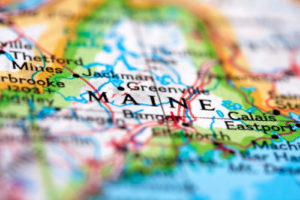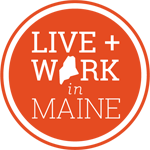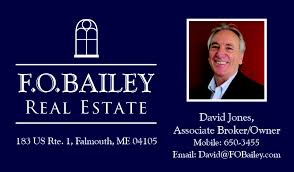
In case you hadn’t noticed yet—maybe you haven’t driven back from a Celtics or Bruins game, or haven’t returned from the warmer climates to our south, but Maine is no longer “Open for Business.”
Oh, don’t be too upset, after all we are running at almost-zero unemployment and things are rolling pretty smoothly, economically speaking…and in reality we ARE actually still open for business. But the new message for local and flatlander alike is now, “Welcome Home.”
To many apolitical, apathetic, or generally uninformed, this may simply seem an interesting switch in concept. The border greetings being swapped was largely expected as leadership transitions from one governor to the next, and even more so with them being political rivals from opposite parties. But the welcome home is not so much as change in attitude as it seems, but more an extension of a shared philosophy.
While many (that is to say, almost everyone) would characterize former Gov. Paul LePage of having a controversial and overbearing approach at times (that is to say, almost always), it is difficult (that is to say, impossible) to ignore the impressive results of his economic initiatives and tough-love welfare reform during his time in office. The Moody’s Investor Service and Standard & Poor’s deemed our state bond ratings as ‘negative’ coming into office in 2010, both reassessed as ‘stable’ on his way out in 2018. LePage’s early days were fraught with outlandish debt and unfriendly taxes, which hampered the ability to attract industry of any sort to set up shop in Maine, much less relocate here. Considered insurmountable, these issues all but disappeared in his final days, with companies, like Iceland’s Eimskip relocating their global shipping U.S. operations from Norfolk, Virginia to Portland’s seaport. His plan seemed to be working.
If there was a dark spot in this silver cloud, it was soon recognized as employees, better yet – the lack of them. Maine’s overall population is definitely aging compared to national averages, and births are declining, which means simply, that retirees will outnumber workers in short order, with that trend continuing with less young people in the future. And of the working-age youth in Maine, many (that is to say, almost everyone) want to escape the most northeastern state of the U.S. for warmer climates and bigger cities. So now what?
 One brilliant idea under the previous administration was to build and strengthen Maine’s University system, and incentivize the students to stay after graduation instead of beelining to the Flatlands. Maine’s Educational Opportunity Tax Credit program works with college grads to pay off their student loans through a tax credit initiative, providing they stay in the state after their degree, with funds forgiven for each additional year they remain here. The idea is, of course, in that time, they have families, come to appreciate their home, and stay forever to raise the next generation.
One brilliant idea under the previous administration was to build and strengthen Maine’s University system, and incentivize the students to stay after graduation instead of beelining to the Flatlands. Maine’s Educational Opportunity Tax Credit program works with college grads to pay off their student loans through a tax credit initiative, providing they stay in the state after their degree, with funds forgiven for each additional year they remain here. The idea is, of course, in that time, they have families, come to appreciate their home, and stay forever to raise the next generation.
Anyone who ever watched the TV show Northern Exposure understands this model is often a point of great amusement for locals, who enjoy being here watching the indentured servants long for parole, and doesn’t always work.Beyond that, even those bad at math could quickly conclude “even if 100% of college graduates in Maine chose to stay here and work, that still [wouldn’t] fulfill our workforce need,” according to Nate Wildes, Engagement Director for the private-sector initiative for Live+Work in Maine. LWM founder, Ed McKersie, launched the initiative along with several others to lure, or lure back, qualified professionals to combat Maine’s record low unemployment.
“If You Left, Maine Wants You Back,” blasted a headline in the Wall Street Journal, upon discovering a new type of lure from the employment industry’s tackle box, trying to tap into the people who left the state for bigger opportunities, but might now be missing a simpler, less-expensive quality of life for their family. But they weren’t alone…
 Boston Magazine also reported on Live + Work in Maine’s aggressive “Visit For a Week, Stay for a Lifetime” program. Select Maine companies offer to reimburse vacation expenses (the amount is up to the individual employer) to employees that are recruited while on holiday and make Vacationland their home.
Boston Magazine also reported on Live + Work in Maine’s aggressive “Visit For a Week, Stay for a Lifetime” program. Select Maine companies offer to reimburse vacation expenses (the amount is up to the individual employer) to employees that are recruited while on holiday and make Vacationland their home.
Approximately 36 million tourists descend on Maine annually. Wouldn’t it be great if some of those folks from the big cities of the Mid-Atlantic, Midwest, and Gulf Coast, and even California stayed to become permanent residents and work here? And this is where newly-inaugurated Gov. Janet Mills’ updated sign comes into view after crossing over the state line.
“Welcome Home.” It’s not a new direction when entering Maine, it’s a new perspective on the same direction—keeping existing (and new) business in the state by attracting (and keeping) people to run them. And who better to attract than the people that love being here?
Full disclosure: I’m one of those people. After stints in Chicago, Boston, and New York City, I found myself discontent with my big-city lifestyle. Everything cost too much, took too long, and was increasingly way too hard. My occasional escapes to Maine every couple months, became monthly, then bi-monthly. Before I realized, they were dangerously close to weekly, I knew I had to move here.
It was a bigger risk then, however. Jobs were uncertain at that time, but foolishly confident enough that it would all work out, and thankfully I was lucky blessed enough that it did!
While certainties are never certain, there is a much stronger economy and employment base here than at any time in recent memory. While it may not be like the boom-time logging days of a century ago, a laptop is lighter than an ax and L.L. Bean’s clothing has become fashionable. Overall, its a great place to be, literally and figuratively. Maine is open for business and we are welcoming the employees home. Sort of like the classic city home seller ad: “If you lived here, you’d be home by now!”
Well, I’m home in Maine and I felt home long before I moved here. It’s nice to see the sign up and know Gov. Mills (and the state as a whole) appreciates having me here. It makes coming home more… homey.
 Robert Witkowski is the Creative Director for Visit Portland, a, freelance designer, and author of “100 things To Do in Portland, Maine Before You Die.” Having lived in Chicago, Boston and New York City, Robert has discovered that urban life is exciting and fun, making his home in Portland’s West End.
Robert Witkowski is the Creative Director for Visit Portland, a, freelance designer, and author of “100 things To Do in Portland, Maine Before You Die.” Having lived in Chicago, Boston and New York City, Robert has discovered that urban life is exciting and fun, making his home in Portland’s West End.






